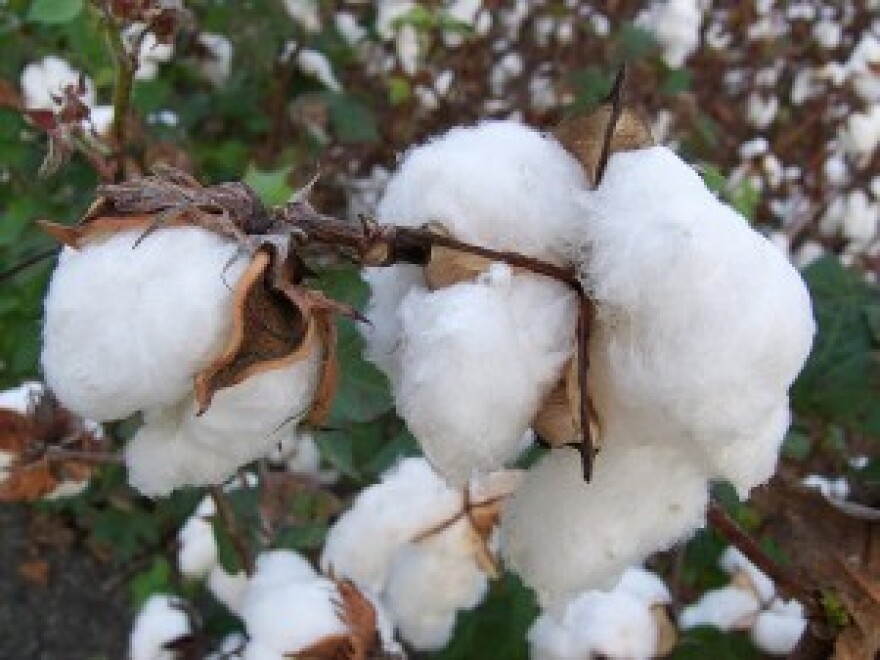Northeast Texas cotton growers will be harvesting soon, as the region's agriculture producers are beginning to suffer from drought effects, according to this week's Texas Agrilife crop and weather report.
Cotton harvest moving south to north
From the Gulf Coast to Dallas, cotton harvesting - or at least preparations for harvest - are going “fast and furious,” according to a Texas A&M AgriLife Extension Service expert.
“There’s going to be a lot of cotton coming out of these fields in a fairly compressed period compared to most years,” said Dr. Gaylon Morgan, an AgriLife Extension statewide cotton specialist.
In the Upper Gulf Coast, the cotton harvest started a couple of weeks ago, but was delayed by rain. However, harvesting there has resumed, Morgan said.
Coastal counties are mostly finished, with harvest progressing up through the Central Texas Blacklands, he said.
“A lot of defoliating has gone on in the past seven to 10 days in the Blacklands, and will continue for the next week,” he said. “Harvesting has begun is some areas of the Blacklands, and will increase this week.”
Without any tropical storms on the immediate horizon, Morgan expected the harvest in the southern half of the state to continue with minimal issues.
“In many cases, we have tropical storms or fall weather bringing more precipitation into the Upper Gulf Coast and Blacklands, but we haven’t had that this year, which has been great for timely harvest and should also keep the fiber quality up,” he said.
South Plains and Rolling Plains cotton – at least that which is irrigated – has made progress thanks to warmer weather, according to Morgan.
“Increased heat units the past couple of weeks have allowed the crop to catch up on maturity,” he said. “The bad news, they haven’t had much moisture.”
In the Rolling Plains, the crop has been late but has looked pretty good most of the summer, but the dryland could use more moisture, he said.
“In most of the High Plains, the dryland crop really doesn’t exist, but the Rolling Plains dryland crop was planted late, got some moisture and should make a respectable crop,” Morgan said.
What could spoil the prospects for the High Plains and Rolling Plains cotton would be an early freeze as the crop is still a little behind in maturity, he said.
East, North Texas getting a taste of drought
East Texas, usually less impacted by drought compared to other parts of the state, has been suffering in recent weeks, according to this week’s regional report from Texas Agrilife.
The entire region needs rain as drought conditions continue to worsen. Lack of rain, high temperatures, and army worm infestations have taken their toll on hay crops and forages.
Burn bans are in effect throughout the region. Grasshoppers continue to be a problem as well.
Very little grazing is available to livestock, and some producers are already feeding hay. Lack of stock-water supplies in pastures are also a problem. Despite the lack of grazing, cattle remain in good condition. Weaning and selling of spring calves and cull cows continues. Field preparation for winter pasture planting has been slow due to the drought.
Corn, sorghum bright spots in scorched North Texas
Grain harvests in North Texas have gone well, but livestock producers have been feeling the drought, according to this week’s Texas Agrilife report.
Soil-moisture levels are very short in some areas. Pastures and rangeland are deteriorating very quickly and livestock watering ponds are dropping. Bermuda grass is turning brown. Pastures in some counties have been grazed down to the point where most producers have had to start heavily feeding supplemental hay.
Livestock are showing signs of heat stress. Local burn bans are in effect across the region. Corn and grain sorghum growers continue to harvest, with above-average yields for both crops, and the harvest is 80-85 percent complete in most counties and 100 percent in others.
Cotton is beginning to open bolls in Delta County. Farmers there have had a problem with sugarcane aphids on sorghum gumming up equipment.



